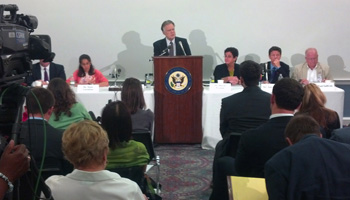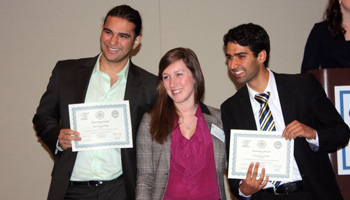October 22-23, 2013
Before the National Council on U.S.-Arab Relations launched its first Annual Arab-U.S. Policymakers Conference in 1991, we asked numerous policymakers a single question:
“What bedevils you the most in your tasks to recommend effective policies?”
The answers differed only slightly from one person to the next. A common theme running through all the responses was, and I paraphrase, the following: The “W” questions are ones that policymakers deal with all the time. In and of themselves, they are difficult enough. They include:
“What” needs to be done;
“When” does it need to be done;
“Why” does it need to be done;
“Where” will we likely be if we do this or if we do not;
“Who” needs to do it; and, sometimes even,
“Whether” something needs to be done.
But the most difficult questions of all, the ones policymakers inform us they find most vexing, are “How” questions, for these, unlike most of the others, cannot be answered with a yes or no. Rather, the answer to each comes with a cost.
- Sometimes the cost is political, as when leaders of an administration’s political party or a government’s most important advisers or constituents are certain to put their foot down and say no.
- Sometimes the cost is financial, as when it is pointed out that there are no funds allocated, authorized, or appropriated for that which is recommended.
- Sometimes the cost lies in having to admit that the requisite competent human resources to implement a policy recommendation simply do not exist.
- Sometimes the cost is one of technology, equipment, and/or structures or systems that do not exist or, if they do, would have to be transferred from where they are to where they are needed more at what, arguably, is a prohibitively high cost in terms of time, effort, and money.
- Sometimes the cost is in credibility, as when an administration or government is on record as being strongly opposed to exactly what someone has just recommended as a solution or a palliative.
- Sometimes the cost is moral in the sense that it clearly violates the Golden Rule of Do Not Do Unto Others What You Would Not Have Others Do To You.
- Sometimes the cost will likely be a sharp downturn in the public approval rating of a president, premier, or head of state.
- Sometimes the cost might be a definite setback to the country’s image and the degree of trust and confidence it seeks to cultivate and maintain among its allies.
With this as background, context, and perspective, there follows a series of questions relating to contemporary Arab-U.S. relations. The questions are ones that policymakers on one side or another, and sometimes both sides, grapple with daily. They are provided in the spirit of a public service. To whom? To not only the policymakers entrusted to improve Arab-U.S. relations and not make them worse. They are also offered as food for thought. Again, to whom? To intellectuals, scholars, teachers, students, analysts, investment strategists, specialists in public policy research institutes, and many others eager to enhance their knowledge and understanding of the state of play in the relations between the United States and the Arab world, and who want to improve these relations.

Dr. John Duke Anthony
Founding President and CEO
National Council on U.S.-Arab Relations
Eight Categories of “ HOW” Questions
U.S.-ARAB ENERGY COOPERATION
U.S.-ARAB DEFENSE COOPERATION
GULF COOPERATION COUNCIL: ROLE IN REGIONAL DYNAMICS
THE PALESTINIAN FUTURE
GEO-POLITICAL DYNAMICS: SYRIA, LEBANON, IRAQ, & IRAN
U.S.-ARAB BUSINESS, FINANCE, AND HUMAN RESOURCE DEVELOPMENT
GEO-POLITICAL DYNAMICS: EGYPT & ARAB NORTH AFRICA
ARAB-U.S. RELATIONS: VIEWS FROM THE ARAB MEDIA
Continue reading »




 The National Council on U.S.-Arab Relations is pleased to provide the twenty-first edition of the Council Chronicle, the Council’s periodic newsletter. The Chronicle seeks to keep the Council’s alumni, donors, and other supporters informed and updated. One among other efforts to do so on an ongoing basis is achieved by presenting highlights and special reports on the Council’s programs, events, and activities. For new readers interested in learning more about the Council’s vision and mission, together with the ways and means it utilizes to pursue both objectives, please visit the Council’s website at
The National Council on U.S.-Arab Relations is pleased to provide the twenty-first edition of the Council Chronicle, the Council’s periodic newsletter. The Chronicle seeks to keep the Council’s alumni, donors, and other supporters informed and updated. One among other efforts to do so on an ongoing basis is achieved by presenting highlights and special reports on the Council’s programs, events, and activities. For new readers interested in learning more about the Council’s vision and mission, together with the ways and means it utilizes to pursue both objectives, please visit the Council’s website at 


 The National Council on U.S.-Arab Relations is pleased to provide the twentieth edition of the Council Chronicle, the Council’s periodic newsletter. The Chronicle seeks to keep the Council’s alumni, donors, and other supporters informed and updated. One among other efforts to do so on an ongoing basis is achieved by presenting highlights and special reports on the Council’s programs, events, and activities. For new readers interested in learning more about the Council’s vision and mission, together with the ways and means it utilizes to pursue both objectives, please visit the Council’s website at
The National Council on U.S.-Arab Relations is pleased to provide the twentieth edition of the Council Chronicle, the Council’s periodic newsletter. The Chronicle seeks to keep the Council’s alumni, donors, and other supporters informed and updated. One among other efforts to do so on an ongoing basis is achieved by presenting highlights and special reports on the Council’s programs, events, and activities. For new readers interested in learning more about the Council’s vision and mission, together with the ways and means it utilizes to pursue both objectives, please visit the Council’s website at 


You must be logged in to post a comment.